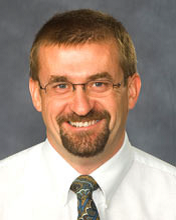Gary Tye, M.D., Virginia Commonwealth University

In my practice as a pediatric neurosurgeon I see children afflicted with brain tumors on a regular basis, either for surgery or in the many required follow-up visits. Despite our best standards of care, many of these children, assuming they survive their cancer, may suffer severe developmental and cognitive deficits as a complication of the treatments. This takes a large toll on the quality of life of my patients. This situation is frustrating for clinicians and devastating to patients and their families. Working together with my colleagues at VCU Health System, in Richmond, we have recently established a research program and laboratory focused on pediatric brain tumors, in order to intensively research the fundamental biology of these tumors and devise new therapies that can provide better treatment options for our kids and overcome the deleterious effects of chemotherapy and radiotherapy.
Each of current lines of research carries this theme and sense of mission, and aims to bring novel therapeutics to the clinic in the near future. This approach gives all involved in the VCU Pediatric Neuro-Oncology Program a strong sense of purpose, motivation and satisfaction as they push to achieve new milestones. Although our Pediatric Program is still in an early stage of development, our research is already making important contributions to pediatric neuro-oncology, and investigating promising new therapies, which is very satisfying.
The opportunity to pursue biomedical research allows clinicians such as myself, and other basic and translational scientists, to gain the specific knowledge we need to develop better treatments for the future. This gives us hope that some day in the future, we will be armed with a more complete understanding of individual tumor subtypes and within those subtypes, what specific targets will prevent growth and recurrence after therapy. Being actively involved in research keeps me engaged in the latest emerging knowledge and means having to constantly remain up to date on the leading edge of biological understanding of brain tumors and of new therapies being developed. One of the difficulties we encounter in pursuing this research is that pediatric brain tumors are less common.
We have an established biorepository and tumor bank from consented patients who allow us their tumor tissue, otherwise discarded, to be used in biomedical research. This is vitally important to our research, but it takes many years to collect enough biological specimens of any particular tumor type to perform statistically or clinically relevant studies. We have partially overcome this difficulty by forming collaborative networks with other centers researching pediatric brain tumors. We have also formed the Pediatric Brain Tumor Xenograft Consortium, a research network with the aim of establishing panels of primary pediatric brain tumor xenograft lines, which can be used in the preclinical phases to investigate novel therapies, prior to entering human clinical trials. This remains a considerable obstacle for translational research, since pediatric primary lines are scarce and are difficult to establish and maintain for ongoing research studies.
By pooling resources and expertise with other centers, we hope to provide a well defined panel of pediatric brain tumor xenograft lines for the broader oncology community to make use of. Funding our research is another challenge, but with efforts of the Childhood Brain Tumor Foundation and similar national charities, new and unprecedented research areas can be developed. Private brain tumor charities, particularly in the United States, play a vital role in propelling the pursuit of newer research and allowing it to get established. With all its challenges, I am glad to dedicate my professional life to investigating new therapies for children. I hope to see our current studies lead to clinical trials for novel targeted therapeutics for pediatric brain tumors within the next few years. This is the aim of our research program, and is what propels our efforts every day.
